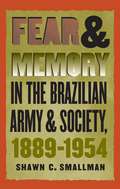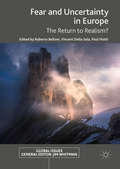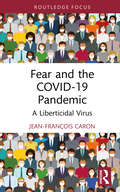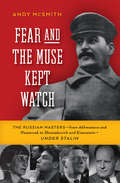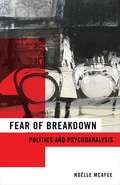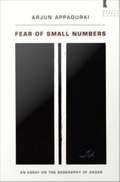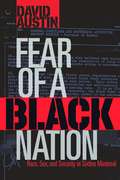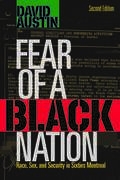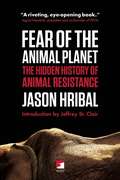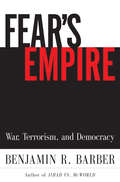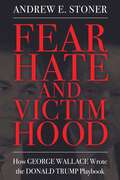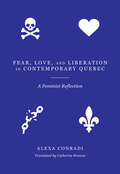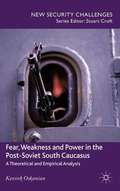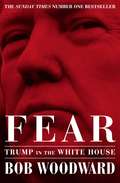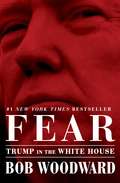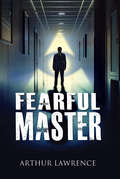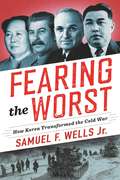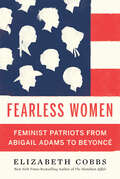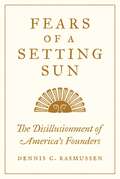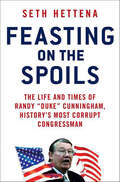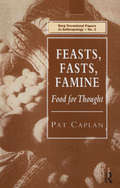- Table View
- List View
Fear and Memory in the Brazilian Army and Society, 1889-1954
by Shawn C. SmallmanFor more than half a century, the Brazilian army used fear and censorship to erase aspects of its history from public memory and to create its own political myths. Although the military had remarkable success in promoting its version of events, recent democratization has allowed scholars access to new materials with which to challenge the "official story." Drawing on oral histories, secret police documents, memoirs of dissident officers, army records, and other sources only recently made available, Shawn Smallman crafts a compelling, revisionist interpretation of Brazil's political history from 1889 to 1954.Smallman examines the topics the Brazilian military wished to obscure--racial politics and terror campaigns, institutional corruption and civil-military alliances, political torture and personal rivalries--to understand the army's growing involvement in civilian affairs. Among the myths he confronts are the military's idealized rendition of its racial policies and its portrayal of itself as above the corruption associated with politicians. His account not only illuminates the origins of the military government's repressive and often brutal actions during the 1960s and 1970s but also carries implications for contemporary Brazil, as the armed forces debate their role in a democratic country.
Fear and Uncertainty in Europe: The Return to Realism? (Global Issues)
by Roberto Belloni Vincent Della Sala Paul ViottiRussia’s intervention in the Ukraine, Donald Trump’s presidency and instability in the Middle East are just a few of the factors that have brought an end to the immediate post-Cold War belief that a new international order was emerging: one where fear and uncertainty gave way to a thick normative and institutional architecture that diminished the importance of material power. This has raised questions about the instruments we use to understand order in Europe and in international relations. The chapters in this book aim to assess whether foreign policy actors in Europe understand the international system and behave as realists. They ask what drives their behaviour, how they construct material capabilities and to what extent they see material power as the means to ensure survival. They contribute to a critical assessment of realism as a way to understand both Europe’s current predicament and the contemporary international system.
Fear and the COVID-19 Pandemic: A Liberticidal Virus
by Jean-François CaronThis book explores the forms of fear that are becoming more visible in liberal democracies and how they now tend to condition our existences in a way that is detrimental to our personal freedom. The author explores how the conception of human existence that now dominates in liberal societies and that places the highest value on the preservation of life at all cost plays a significant role in this regard. He explores the origins of this form of biopolitics that has emerged after the end of the Cold War and shows how it has dramatically changed our relationship with the state and also explains how this new dynamic has been favorable to the imposition of disproportional restrictions on our individual freedom. The Covid-19 pandemic has indeed shown that when the fear of dying ends up taking precedence over any other considerations, individuals and societies are led on an illiberal path that can only contribute to the gradual erosion of their liberties and on the development and acceptance of a new type of governance that justifies the imposition of liberticidal measures. This book will appeal to scholars and students of political theory and comparative democracy, civil rights advocates and media professionals interested in questions related to liberalism and its post-Cold War evolution.
Fear and the Muse Kept Watch
by Andy McsmithIn this dazzling exploration of one of the most contradictory periods of literary and artistic achievement in modern history, journalist Andy McSmith evokes the lives of more than a dozen of the most brilliant artists and writers of the twentieth century. Taking us deep into Stalin’s Russia, Fear and the Muse Kept Watch asks the question: can great art be produced in a police state? For although Josif Stalin ran one of the most oppressive regimes in world history, under him Russia also produced an outpouring of artistic works of immense and lasting power--from the poems of Anna Akhmatova and Osip Mandelstam to the opera Peter and the Wolf, the film Alexander Nevsky, and the novels The Master and Margarita and Doctor Zhivago. For those artists visible enough for Stalin to take an interest in them, it was Stalin himself who decided whether they lived in luxury or were sent to the Lubyanka, the headquarters of the secret police, to be tortured and sometimes even executed. McSmith brings together the stories of these artists--including Isaac Babel, Boris Pasternak, Dmitri Shostakovich, and many others--revealing how they pursued their art under Stalin’s regime and often at great personal risk. It was a world in which the poet Vladimir Mayakovsky, whose bright yellow tunic was considered a threat to public order under the tsars, struggled to make the communist authorities see the value of avant garde art; Babel publicly thanked the regime for allowing him the privilege of not writing; and Shostakovich’s career veered wildly between public disgrace and wealth and acclaim. In the tradition of Eileen Simpson’s Poets in Their Youth and Phyllis Rose’s Parallel Lives, Fear and the Muse Kept Watch is an extraordinary work of historical recovery. It is also a bold exploration of the triumph of art during terrible times and a book that will stay with its readers for a long, long while.
Fear of Breakdown: Politics and Psychoanalysis (New Directions in Critical Theory #65)
by Noëlle McAfeeWhat is behind the upsurge of virulent nationalism and intransigent politics across the globe today? In Fear of Breakdown, Noëlle McAfee uses psychoanalytic theory to explore the subterranean anxieties behind current crises and the ways in which democratic practices can help work through seemingly intractable political conflicts. Working at the intersection of psyche and society, McAfee draws on psychoanalyst D. W. Winnicott’s concept of the fear of breakdown to show how hypernationalism stems from unconscious anxieties over the origins of personal and social identities, giving rise to temptations to reify exclusionary phantasies of national origins.Fear of Breakdown contends that politics needs something that only psychoanalysis has been able to offer: an understanding of how to work through anxieties, ambiguity, fragility, and loss in order to create a more democratic politics. Coupling robust psychoanalytic theory with concrete democratic practice, Fear of Breakdown shows how a politics of working through can help counter a politics of splitting, paranoia, and demonization. McAfee argues for a new approach to deliberative democratic theory, not the usual philosopher-sanctioned process of reason-giving but an affective process of making difficult choices, encountering others, and mourning what cannot be had.
Fear of Small Numbers: An Essay on the Geography of Anger
by Arjun AppaduraiThe period since 1989 has been marked by the global endorsement of open markets, the free flow of finance capital and liberal ideas of constitutional rule, and the active expansion of human rights. Why, then, in this era of intense globalization, has there been a proliferation of violence, of ethnic cleansing on the one hand and extreme forms of political violence against civilian populations on the other? Fear of Small Numbers is Arjun Appadurai's answer to that question. A leading theorist of globalization, Appadurai turns his attention to the complex dynamics fueling large-scale, culturally motivated violence, from the genocides that racked Eastern Europe, Rwanda, and India in the early 1990s to the contemporary "war on terror. " Providing a conceptually innovative framework for understanding sources of global violence, he describes how the nation-state has grown ambivalent about minorities at the same time that minorities, because of global communication technologies and migration flows, increasingly see themselves as parts of powerful global majorities. By exacerbating the inequalities produced by globalization, the volatile, slippery relationship between majorities and minorities foments the desire to eradicate cultural difference. Appadurai analyzes the darker side of globalization: suicide bombings; anti-Americanism; the surplus of rage manifest in televised beheadings; the clash of global ideologies; and the difficulties that flexible, cellular organizations such as Al-Qaeda present to centralized, "vertebrate" structures such as national governments. Powerful, provocative, and timely, Fear of Small Numbers is a thoughtful invitation to rethink what violence is in an age of globalization.
Fear of a Black Nation: Race, Sex, and Security in Sixties Montreal
by David AustinIn the 1960s, for at least a brief moment, Montreal became what seemed an unlikely centre of Black Power and the Caribbean left. In October 1968 the Congress of Black Writers at McGill University brought together well-known Black thinkers and activists from Canada, the United States, Africa, and the Caribbean—people like C.L.R. James, Stokely Carmichael, Miriam Makeba, Rocky Jones, and Walter Rodney. Within months of the Congress, a Black-led protest at Sir George Williams University (now Concordia) exploded on the front pages of newspapers across the country—raising state security fears about Montreal as the new hotbed of international Black radical politics.
Fear of a Black Nation: Race, Sex, and Security in Sixties Montreal
by David AustinIn the 1960s, Montreal was a hotbed of radical politics that attracted Black and Caribbean figures such as C.L.R. James, Walter Rodney, Mariam Makeba, Stokely Carmichael, Rocky Jones, and Édouard Glissant. It was also a place where the ideas of Frantz Fanon, Aimé Césaire, and Malcolm X circulated alongside those of Karl Marx, Jean-Paul Sartre, and Simone de Beauvoir. During this period of global upheaval and heightened Canadian and Quebec nationalism, Montreal became a central site of Black and Caribbean radical politics. Situating Canada within the Black radical tradition and its Caribbean radical counterpart, Fear of a Black Nation paints a history of Montreal and the Black activists who lived in, sojourned in, or visited the city and agitated for change. Drawing on Saidiya Hartman’s conception of slavery’s afterlife and what David Austin describes as biosexuality – a deeply embedded fear of Black self-organization and interracial solidarity – Fear of a Black Nation argues that the policing and surveillance of Black lives today is tied to the racial, including sexual, codes and practices and the discipline and punishment associated with slavery. As meditation on Black radical politics and state security surveillance and repression, Fear of a Black Nation combines theoretical and philosophical inquiry with literary, oral, and archival sources to reflect on Black political organizing. In reflecting on Black self-organization and historic events such as the Congress of Black Writers and the Sir George Williams Affair, the book ultimately poses the question: what can past freedom struggles teach us about the struggle for freedom today? Featuring two new interviews with the author and a new preface, this expanded second edition enriches the political and theoretical conversation on Black organising and movement building in Canada and internationally. As the Black Lives Matter and abolition movements today popularize calls to disarm and defund the police and to abolish prisons, Fear of a Black Nation provides an invaluable reflection on the policing of Black activism and a compelling political analysis of social movements and freedom struggles that is more relevant now than ever.
Fear of the Animal Planet
by Jason Hribal Jeffery St. ClairTaking the reader deep inside of the circus, the zoo, and similar operations, Fear of the Animal Planet provides a window into animal behavior: chimpanzees escape, elephants attack, orcas demand more food, and tigers refuse to perform. Indeed, these animals are rebelling with intent and purpose. They become true heroes and our understanding of them will never be the same.
Fear's Empire: War, Terrorism, and Democracy
by Benjamin R. Barber"Fear's Empire lays the foundation for a principled opposition based on America's truest and best values."--Senator Gary Hart The author of Jihad vs. McWorld analyzes how American foreign policy has gone wrongand how it could go right. In this hard-hitting but pragmatic new critique of the Bush administration's foreign policy, Benjamin R. Barber exposes in detail the folly of an agenda of preventive war, placing it in the context of two hundred years of American strategic doctrine (including the recent history of deterrence and containment). He shows how chosen "rogue states" have been made to stand in for terrorists too difficult to locate and destroy, and how the United States continues to support dictatorship in nations it regards as friends, while still believing we can impose democracy on vanquished enemies at the barrel of a gun. Barber argues for an America that promotes cooperation, multilateralism, international law, and pooled sovereignty. For as law and citizenship alone secure liberty within nations, law and citizenship alone can secure liberty among them, freeing them from fear.
Fear, Hate, and Victimhood: How George Wallace Wrote the Donald Trump Playbook (Race, Rhetoric, and Media Series)
by Andrew E. StonerWhen Donald Trump announced his campaign for president in 2015, journalists, historians, and politicians alike attempted to compare his candidacy to that of Governor George Wallace. Like Trump, Wallace, who launched four presidential campaigns between 1964 and 1976, utilized rhetoric based in resentment, nationalism, and anger to sway and eventually captivate voters among America’s white majority. Though separated by almost half a century, the campaigns of both Wallace and Trump broke new grounds for political partisanship and divisiveness.In Fear, Hate, and Victimhood: How George Wallace Wrote the Donald Trump Playbook, author Andrew E. Stoner conducts a deep analysis of the two candidates, their campaigns, and their speeches and activities, as well as their coverage by the media, through the lens of demagogic rhetoric. Though past work on Wallace argues conventional politics overcame the candidate, Stoner makes the case that Wallace may in fact be a prelude to the more successful Trump campaign.Stoner considers how ideas about “in-group” and “out-group” mentalities operate in politics, how anti-establishment views permeate much of the rhetoric in question, and how expressions of victimhood often paradoxically characterize the language of a leader praised for “telling it like it is.” He also examines the role of political spectacle in each candidate’s campaigns, exploring how media struggles to respond to—let alone document—demagogic rhetoric.Ultimately, the author suggests that the Trump presidency can be understood as an actualized version of the Wallace presidency that never was. Though vast differences exist, the demagogic positioning of both men provides a framework to dissect these times—and perhaps a valuable warning about what is possible in our highly digitized information society.
Fear, Love, and Liberation in Contemporary Québec: A Feminist Reflection
by Alexa ConradiIn response to rapid and unsettling social, economic, and climate changes, fearmongering now features as a main component of public life. Right-wing nationalist populism has become a hallmark of politics around the world. No less so in Quebec. Alexa Conradi has made it her life’s work to understand and to generate thoughtful debate about this worrisome trend. As the first President of Québec solidaire and the president of Canada’s largest feminist organisation, the Fédération des femmes du Québec, Conradi refused to shy away from difficult issues: the Charter of Quebec Values, religion and Islam, sovereignty, rape culture and violence against women, extractive industries and the treatment of Indigenous women, austerity policy and the growing gap between rich and poor. This determination to address uncomfortable subjects has made Conradi—an anglo-Montrealer—a sometimes controversial leader. In Fear, Love, and Liberation in Contemporary Quebec, Conradi invites us to take off our rose-coloured glasses and to examine Quebec’s treatment of women with more honesty. Through her personal reflections on Quebec politics and culture, she dispels the myth that gender equality has been achieved and paves the way for a more critical understanding of what remains to be done.
Fear, Weakness and Power in the Post-Soviet South Caucasus
by Kevork OskanianThis book provides a detailed, multi-level analysis of international security in the South Caucasus and considers whether this region of the former Soviet Union, with several as yet unresolved, 'frozen' separatist conflicts, can move towards a more peaceable future. Using three concepts from Regional Security Complex Theory, amity/enmity, state incoherence and great power penetration, Oskanian forms a unique conceptual expansion of the theory, providing a comprehensive examination of both material conditions and discourses of insecurity. Applying this expanded framework onto a region of considerable complexity and conflict, the book considers the hostility between the South Caucasian states, the fissures underlying their secessionist conflicts, and the regional involvement of great powers, outlining the broader narratives that pervade societies in Armenia, Azerbaijan and Georgia. The book also assesses the emergence of a security regime in the Southern Caucasus and offers a critical-prescriptive assessment of policy implications for both regional and extra-regional actors concerned with improved regional stability.
Fear: Trump in the White House
by Bob WoodwardTHE INSIDE STORY ON PRESIDENT TRUMP, AS ONLY BOB WOODWARD CAN TELL IT. <P><P>With authoritative reporting honed through eight presidencies from Nixon to Obama, author Bob Woodward reveals in unprecedented detail the harrowing life inside President Donald Trump’s White House and precisely how he makes decisions on major foreign and domestic policies. Woodward draws from hundreds of hours of interviews with firsthand sources, meeting notes, personal diaries, files and documents. The focus is on the explosive debates and the decision-making in the Oval Office, the Situation Room, Air Force One and the White House residence. <P><P>Fear is the most intimate portrait of a sitting president ever published during the president’s first years in office.
Fear: Trump in the White House
by Bob WoodwardOVER 2 MILLION COPIES SOLD RUNAWAY #1 NEW YORK TIMES BESTSELLER SENSATIONAL #1 INTERNATIONAL BESTSELLER &“Explosive.&”—The Washington Post &“Devastating.&”—The New Yorker &“Unprecedented.&”—CNN &“Great reporting...astute.&”—Hugh Hewitt THE INSIDE STORY ON PRESIDENT TRUMP, AS ONLY BOB WOODWARD CAN TELL ITWith authoritative reporting honed through nine presidencies, author Bob Woodward reveals in unprecedented detail the harrowing life inside President Donald Trump&’s White House and precisely how he makes decisions on major foreign and domestic policies. Fear is the most intimate portrait of a sitting president ever published during the president&’s first years in office. The focus is on the explosive debates and the decision-making in the Oval Office, the Situation Room, Air Force One and the White House residence. Woodward draws from hundreds of hours of interviews with firsthand sources, meeting notes, personal diaries, files and documents. Often with day-by-day details, dialogue and documentation, Fear tracks key foreign issues from North Korea, Afghanistan, Iran, the Middle East, NATO, China and Russia. It reports in-depth on Trump&’s key domestic issues particularly trade and tariff disputes, immigration, tax legislation, the Paris Climate Accord and the racial violence in Charlottesville in 2017. Fear presents vivid details of the negotiations between Trump&’s attorneys and Robert Mueller, the special counsel in the Russia investigation, laying out for the first time the meeting-by-meeting discussions and strategies. It discloses how senior Trump White House officials joined together to steal draft orders from the president&’s Oval Office desk so he would not issue directives that would jeopardize top secret intelligence operations. &“It was no less than an administrative coup d&’état,&” Woodward writes, &“a nervous breakdown of the executive power of the most powerful country in the world.&”
Fearful Master
by Arthur LawrenceAmerica is at war in several Middle Eastern states, and anti-Muslim sentiment is everywhere. Jason Currie, a Canadian intelligence analyst, has been assigned to SECOR, Homeland Security's far more powerful replacement. Because of his Lebanese background, Jason is falsely detained with innocent Muslims, but is rescued by his SECOR superior, General Hawk. While on assignment, Jason discovers that his childhood friend Nabil "Bil" Maron is too compliant with the Administration's hard-right policies. Meanwhile, Miriam, Bil's sister, Jason's ex-lover, and an ardent protestor, has fled to Guadalajara. Upon their return to LA, Hawk sends Jason to Mexico to lure Miriam back but, before he can help her, Jason is held captive, and is forced to confront the dark and covert world of US anti-terrorism. Fearful Master is the debut novel from Arthur Lawrence. Through Jason Currie, you will experience firsthand the razor-thin line that divides security and terrorism. Currie's world twists and turns, leaving him caught between two Americas: one founded by freedom; the other controlled by fear.
Fearing the Immigrant: Racialization and Urban Policy in Toronto
by Parastou SaberiA fascinating deep dive into one city&’s urban policy—and the anxiety over immigrants that informs it The city of Toronto is often held up as a leader in diversity and inclusion. In Fearing the Immigrant, however, Parastou Saberi argues that Toronto&’s urban policies are influenced by a territorialized and racialized security agenda—one that parallels the &“War on Terror.&” Focusing on the figure of the immigrant and so-called immigrant neighborhoods as the targets of urban policy, Saberi offers an innovative, multidisciplinary approach to the politics of racialization and the governing of alterity through space in contemporary cities.A comprehensive study of urban policymaking in Canada&’s largest city from the 1990s to the late 2010s, Fearing the Immigrant uses Toronto as a jumping-off point to understand how the nexus of development, racialization, and security works at the urban and international levels. Saberi situates urban policymaking in Toronto in relation to the dominant policies of international development and public health, counterinsurgency, and humanitarian intervention. Engaging with the genealogies and contemporary developments of major policy techniques involving mapping and policy concepts such as poverty, security, policing, development, empowerment, as well as social determinants of health, equity, and prevention, she scrutinizes the parallel ways these techniques and concepts operate in urban policy and international relations. Fearing the Immigrant ultimately asserts that the geopolitical fear of the immigrant is central to the formation of urban policy in Toronto. Rather than addressing the root causes of poverty, urban policy as it has been practiced aims to pacify the specter of urban unrest and to secure the production of a neocolonial urban order. As such, this book is an urgent call to reimagine urban policy in the name of equality and social justice.
Fearing the Worst: How Korea Transformed the Cold War (Woodrow Wilson Center Series)
by Dr. Samuel F. Wells Jr.After World War II, the escalating tensions of the Cold War shaped the international system. Fearing the Worst explains how the Korean War fundamentally changed postwar competition between the United States and the Soviet Union into a militarized confrontation that would last decades.Samuel F. Wells Jr. examines how military and political events interacted to escalate the conflict. Decisions made by the Truman administration in the first six months of the Korean War drove both superpowers to intensify their defense buildup. American leaders feared the worst-case scenario—that Stalin was prepared to start World War III—and raced to build up strategic arms, resulting in a struggle they did not seek out or intend. Their decisions stemmed from incomplete interpretations of Soviet and Chinese goals, especially the belief that China was a Kremlin puppet. Yet Stalin, Mao, and Kim Il-sung all had their own agendas, about which the United States lacked reliable intelligence. Drawing on newly available documents and memoirs—including previously restricted archives in Russia, China, and North Korea—Wells analyzes the key decision points that changed the course of the war. He also provides vivid profiles of the central actors as well as important but lesser known figures. Bringing together studies of military policy and diplomacy with the roles of technology, intelligence, and domestic politics in each of the principal nations, Fearing the Worst offers a new account of the Korean War and its lasting legacy.
Fearless Speech: Breaking Free from the First Amendment
by Mary Anne FranksA powerful debunking of First Amendment orthodoxy that critiques "reckless speech," which endangers vulnerable groups, and elevates "fearless speech," which seeks to advance equality and democracy. Freedom of speech has never been more important—or more controversial. From debates about what's permissible on social media, to the politics of campus speakers and corporate advertisements, the First Amendment is incessantly in the news and constantly being held up as the fundamental principle of American democracy. Yet, in reality, it has contributed more to eroding our democracy than supporting it. In Fearless Speech, Dr. Mary Anne Franks emphasizes the distinction between what speech a democratic society should protect and what speech a democratic society should promote. While the First Amendment in theory is politically neutral, in practice it has been legally deployed most visibly and effectively to promote powerful antidemocratic interests: misogyny, racism, religious zealotry, and corporate self-interest, in other words, reckless speech. Instead, Franks argues, we need to focus on fearless speech—speakers who have risked their safety, their reputations, and in some cases their lives, to call out injustice and hold the powerful accountable. Whether it be civil rights leaders, the women of the #MeToo movement, or pro-choice advocates, Franks shows us how their cases and their voices can allow us to promote a more democratic version of free speech. Told through an accessible narrative and ending with a call for change that urges us to reevaluate the legal precedents and uses of the First Amendment, Fearless Speech is a revelatory new argument that urges us to reimagine what our society could look like.
Fearless Women: Feminist Patriots from Abigail Adams to Beyoncé
by Elizabeth CobbsThis passionate and inspiring book by the New York Times bestselling author of The Hello Girls shows us that the quest for women’s rights is deeply entwined with the founding story of the United States.When America became a nation, a woman had no legal existence beyond her husband. If he abused her, she couldn’t leave without abandoning her children. Abigail Adams tried to change this, reminding her husband John to “remember the ladies” when he wrote the Constitution. He simply laughed—and women have been fighting for their rights ever since.Fearless Women tells the story of women who dared to take destiny into their own hands. They were feminists and antifeminists, activists and homemakers, victims of abuse and pathbreaking professionals. Inspired by the nation’s ideals and fueled by an unshakeable sense of right and wrong, they wouldn’t take no for an answer. In time, they carried the country with them.The first right they won was the right to learn. Later, impassioned teachers like Angelina Grimké and Susan B. Anthony campaigned for the right to speak in public, lobby the government, and own property. Some were passionate abolitionists. Others fought just to protect their own children.Many of these women devoted their lives to the cause—some are famous—but most pressed their demands far from the spotlight, insisting on their right to vote, sit on a jury, control the timing of their pregnancies, enjoy equal partnerships, or earn a living. At every step, they faced fierce opposition. Elizabeth Cobbs gives voice to fearless women on both sides of the aisle, most of whom considered themselves patriots. Rich and poor, from all backgrounds and regions, they show that the women’s movement has never been an exclusive club.
Fears of a Setting Sun: The Disillusionment of America's Founders
by Dennis C. RasmussenThe surprising story of how George Washington, Alexander Hamilton, John Adams, and Thomas Jefferson came to despair for the future of the nation they had createdAmericans seldom deify their Founding Fathers any longer, but they do still tend to venerate the Constitution and the republican government that the founders created. Strikingly, the founders themselves were far less confident in what they had wrought, particularly by the end of their lives. In fact, most of them—including George Washington, Alexander Hamilton, John Adams, and Thomas Jefferson—came to deem America’s constitutional experiment an utter failure that was unlikely to last beyond their own generation. Fears of a Setting Sun is the first book to tell the fascinating and too-little-known story of the founders’ disillusionment.As Dennis Rasmussen shows, the founders’ pessimism had a variety of sources: Washington lost his faith in America’s political system above all because of the rise of partisanship, Hamilton because he felt that the federal government was too weak, Adams because he believed that the people lacked civic virtue, and Jefferson because of sectional divisions laid bare by the spread of slavery. The one major founder who retained his faith in America’s constitutional order to the end was James Madison, and the book also explores why he remained relatively optimistic when so many of his compatriots did not. As much as Americans today may worry about their country’s future, Rasmussen reveals, the founders faced even graver problems and harbored even deeper misgivings.A vividly written account of a chapter of American history that has received too little attention, Fears of a Setting Sun will change the way that you look at the American founding, the Constitution, and indeed the United States itself.
Feasibility of Using Mycoherbicides for Controlling Illicit Drug Crops
by Committee on Mycoherbicides for Eradicating Illicit Drug CropsThe control of illicit-drug trafficking and drug use is a difficult and complex process that involves a variety of prevention, control, treatment, and law enforcement strategies. Eradication strategies for controlling illicit-drug crops are used to target the beginning of the drug-supply chain by preventing or reducing crop yields. Mycoherbicides have been proposed as an eradication tool to supplement the current methods of herbicide spraying, mechanical removal, and manual destruction of illicit-drug crops. Some people regard them as preferable to chemical herbicides for controlling illicit-drug crops because of their purported specificity to only one plant species or a few closely related species. As living microorganisms, they have the potential to provide long-term control if they can persist in the environment and affect later plantings. Research on mycoherbicides against illicit-drug crops has focused on three pathogens: Fusarium oxysporum f. sp. cannabis for cannabis (Cannabis sativa), F. oxysporum f. sp. erythroxyli for coca (Erythroxylum coca and E. novogranatense), and Crivellia papaveracea or Brachycladium papaveris (formerly known as Pleospora papaveracea and Dendryphion penicillatum, respectively) for opium poppy (Papaver somniferum). Feasibility of Using Mycoherbicides for Controlling Illicit Drug Crops addresses issues about the potential use of the proposed mycoherbicides: their effectiveness in eradicating their target plants; the feasibility of their large-scale industrial manufacture and delivery; their potential spread and persistence in the environment; their pathogenicity and toxicity to nontarget organisms, including other plants, fungi, animals, and humans; their potential for mutation and resulting effects on target plants and nontarget organisms; and research and development needs. On the basis of its review, the report concludes that the available data are insufficient to determine the effectiveness of the specific fungi proposed as mycoherbicides to combat illicit-drug crops or to determine their potential effects on nontarget plants, microorganisms, animals, humans, or the environment. However, the committee offers an assessment of what can and cannot be determined at the present time regarding each of the issues raised in the statement of task.
Feast of the Goat
by Mario Vargas LlosaHaunted all her life by feelings of terror and emptiness, forty-nine-year-old Urania Cabral returns to her native Dominican Republic and finds herself reliving the events of 1961, when the capital was still called Trujillo City and one old man terrorized a nation of three million. Rafael Trujillo, the depraved, ailing dictator whom Dominicans call the Goat, controls his inner circle (including Urania's father, a secretary of state now in disgrace) with a combination of violence and blackmail. In Trujillo's gaudy palace, treachery and cowardice have become a way of life. But Trujillo's grasp is slipping. There is a conspiracy against him, and a Machiavellian revolution is already under way that will have bloody consequences of its own. In this magisterial and long-awaited novel, Mario Vargas Llosa recounts the end of a regime and the terrible birth of a democracy, giving voice to the historical Trujillo and to the victims, both innocent and complicit, who were drawn into his deadly orbit.
Feasting on the Spoils: The Life and Times of Randy "Duke" Cunningham, History's Most Corrupt Congressman
by Seth HettenaRandy "Duke" Cunningham was an ace fighter pilot and Top Gun instructor. He came back from battle as Vietnam's most famous pilot—a Navy hero in an unpopular war. In his political life, Cunningham was an eight-term United States representative who never lost an election. So how did this powerful politician, one of the Vietnam War's most highly decorated pilots, become the most corrupt congressman in U.S. history?In 2005, Cunningham shocked the nation by pleading guilty to charges of conspiracy to commit bribery, fraud, and tax evasion. A federal judge sentenced him to more than eight years in prison, the longest sentence handed down to a member of Congress in 40 years. And even as Cunningham was led, weeping, to prison, investigators continued to uncover a deep-rooted scandal, reaching the cozy nexus between Congress and lobbyists, military contractors, the Defense Department and the upper ranks of the Central Intelligence Agency.Cunningham's bribes were seemingly endless. They included a yacht, a Rolls-Royce, and hundreds of thousands of dollars' worth of antiques. Defense contractors flew him aboard private chartered jets to luxury destinations, picked up the tab at expensive restaurants, and paid for his daughter's graduation party. In total, he collected at least $2.4 million in five years, a series of acts unequaled in the long, sordid history of congressional corruption. An ongoing investigation is even exploring allegations that prostitutes were hired by Cunningham's associates to entertain the congressman. His corruption and that of his cohorts was a decisive factor in the 2006 elections, as Democrats retook control of the House for the first time in more than a decade.What led a man who showed such strength and resolve in battle to show such moral weakness later in life? Had he become a prisoner of greed or was he manipulated by others far more cunning than he? What happened to Randy Cunningham? In Feasting on the Spoils, Hettena offers a probing look at deception and avarice. He paints an unforgettable portrait of a life publicly unraveled, and of a man for whom the mysteries—and the history of fraud—only seem to deepen.
Feasts, Fasts, Famine: Food for Thought (Occasional Papers In Anthropology Ser. #Vol. 2)
by Pat CaplanThis study deals with three domains of food which raise complex epistemological, political and moral issues. Through an examination of a wide range of material drawn from anthropology, history, literature and political economy, the author discusses the relationship between food and entitlement, gender, notions of the body and development. Food is shown to be a powerful metaphor for our sense of self, our social and political relations, our cosmology and our global system.
